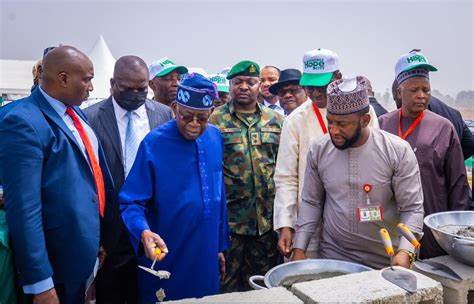Nigeria has over two hundred and forty million people spread over a land area of approximately 923,000 square kilometres. With a huge population, Nigeria’s housing demand is about ten point seven one (10.71) million units resulting in a housing deficit of between twenty-two to twenty-eight million units. This shows that 700,000 housing units are required yearly to close the deficit, but the annual construction of houses in Nigeria is below 10,000 units.
When President Bola Ahmed Tinubu assumed office on May 29, 2023, he assured Nigerians that his administration would change the narratives in the housing sector by turning the country into a construction site with massive job creation and wealth redistribution amongst Nigerians.
The Nigerian President launched the Renewed Hope City Housing project with a clear vision to apply the mortgage and housing sector to reduce the deficit and guarantee efficient and people’s friendly mass housing for Nigerians.
Housing and Urban Development Minister, Ahmed Musa Dangiwa said that the plan was to deliver 100, 000 units for families of low to middle-income earners in the first phase of the housing project in eighteen months. Dangiwa stated that over N126.5 billion Naira has been approved for the provision of housing units across Nigeria in 18 months.
Under the scheme’s first phase, 50,000 units of houses are expected to be delivered to Nigerians across the 36 states and the Federal Capital Territory by the end of 2024. To achieve this, the President created the Ministry of Housing and Urban Development, separate from the Ministry of Works for proper alignment towards attaining the massive housing mandate.
At Karsana, in the nation’s capital, Abuja, President Bola Tinubu performed the groundbreaking ceremony of the pilot phase of the mass housing project.
The ceremony activated the housing plans and states in the country are already indicating interest in the phases of housing units through Estates Development Programmes Mass Housing Policy by the government. The funding for the projects is expected to come from a mixture of sponsors, comprising the Federal Ministry of Housing and Urban Development, the Federal Mortgage Bank of Nigeria and Public-Private Partnerships with reputable developers.
Under this concept, the housing units will be sold at commercial rates, while a substantial percentage will be sold at concessionary rates to low- and medium-income members of the Nigeria Labour Congress and the Trade Union Congress.
Undoubtedly, this project would address the country’s huge housing deficit, which has been worsened by increasing population, lack of an effective mortgage system, poor funding, and increased construction materials costs as well as rural/urban migration. President Tinubu’s administration is also working to correct some inadequacies that prevented previous administrations from actualizing past housing schemes to reduce the deficit.
One area that President Tinubu’s administration should look into in the housing policy implementation is mortgage. Deliberate efforts to strengthen the mortgage sector will give citizens increased access to long-term and affordable mortgages that will enable them to own their homes. This will also attract more investments in the housing sector to reduce rural-urban migration which raised the demand for houses in the country.
The Renewed Hope Housing project should emphasize the role of Public Private Partnership models for the provision of infrastructure in line with the landlord-tenant law and Land Use Act provisions.
The Tinubu administration’s housing policy and programmes under the renewed hope agenda will raise the hopes of the people by providing shelter over their heads soon and reducing the housing deficit in Nigeria.

